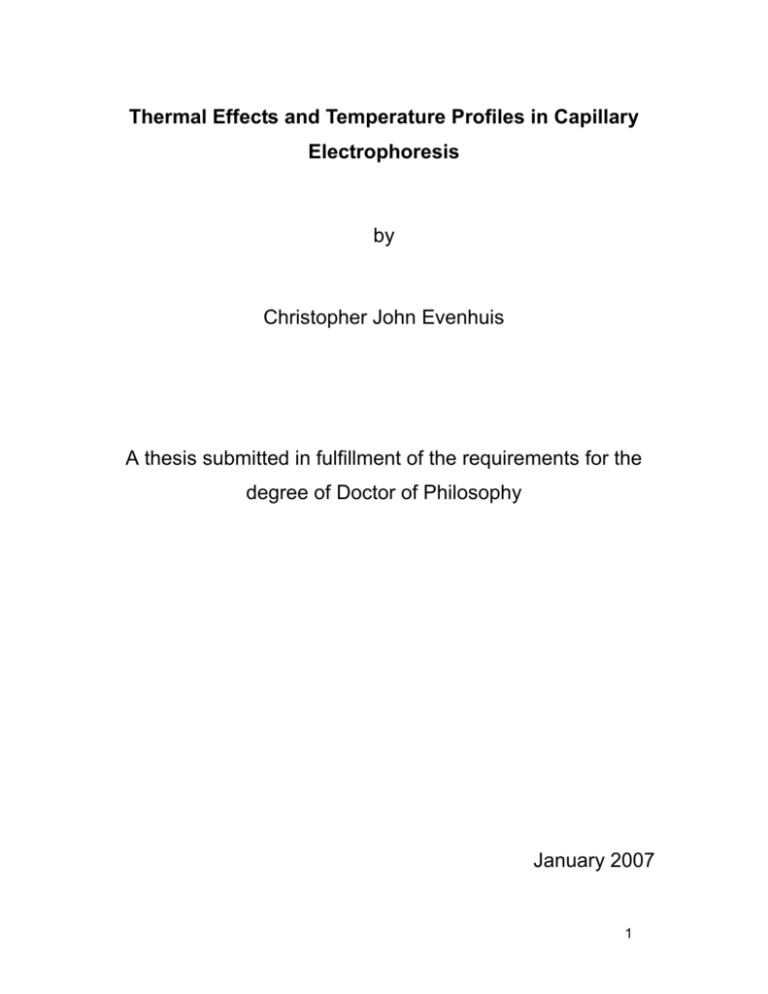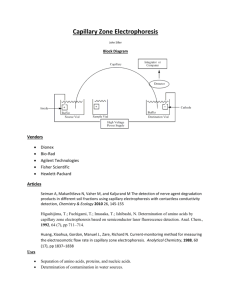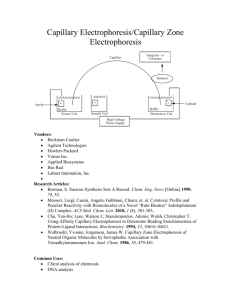Thermal Effects and Temperature Profiles in Capillary
advertisement

Thermal Effects and Temperature Profiles in Capillary Electrophoresis by Christopher John Evenhuis A thesis submitted in fulfillment of the requirements for the degree of Doctor of Philosophy January 2007 1 Declaration To the best of my knowledge, this thesis contains no copy or paraphrase of material previously written or published, except where due reference is made. This thesis may be made available for loan, and limited copying in accordance with the Copyright Act 1968. Christopher John Evenhuis 10 January 2007 2 Acknowledgements I would like to thank the following people for their help and encouragement over the last three years. My primary supervisor Dr Miroslav Macka for his guidance, enthusiasm and generosity with his time and resources to support my project. My research supervisor Dr Rosanne M Guijt for her help, encouragement and invaluable proofreading of numerous drafts of manuscripts. My associate supervisors Prof. Paul R. Haddad and Prof Philip J. Marriot for their wisdom and guidance and polishing of manuscripts. Dr Cameron Johns for getting me started in capillary electrophoresis. Dr Michael C. Breadmore for many helpful suggestions and instructing me on how to maintain and repair my capillary electrophoresis instrument. Dr Emily F. Hilder for her assistance and encouragement. All members of the Australian Centre for Research on Separation Science John Davis and Paul Waller for electronic technical assistance. Dr I. Koev for the gift of PMMA capillary. 3 Xiangchun Xuan and Donqing Li for supply of original data files for Figures Error! Reference source not found. to Error! Reference source not found.. Vlastmil Hruška for assistance in performing ionic strength corrections to electrophoretic mobilities and for useful collaboration in Prague. Mrs. Violet Giblin for her continued interest and enthusiasm. My parents Dr A. J. Evenhuis and Dr E.K. Evenhuis for their encouragement. My friend and prayer partner Omar Venegas for his encouragement and prayer support throughout the course of my research. My daughters Ruth and Elyse for their continued interest and encouragement. My wife Rosanne for her help in supporting our family during the course of my research and for her constant friendship and encouragement. Finally I thank God for leading me back in to academia and for supplying all my needs. This work is dedicated to Him. Trust in the LORD with all your heart, and lean not on your own understanding; in all your ways acknowledge Him, and He shall direct your paths. Proverbs 3:5-6 (NKJ) 4 Glossary of Terms Abbreviation α β γ Quantity Unit Thermal diffusivity Reciprocal of film temperature Temperature coefficient of electrical conductivity Temperature-dependence of the diffusion coefficient thickness of the thermal boundary layer Pressure gradient in section i of the capillary. m2s-1 K-1 ºC-1 Dimensionless ºC Temperature difference across air layer surrounding capillary (see Error! Reference source not found.) Temperature difference across the capillary wall (sum of ΔTFS and ΔTPI (see Error! Reference source not found.) Change of electrolyte temperature at capillary axis as a result of Joule heating Temperature difference across coolant layer surrounding capillary Temperature difference across fused-silica wall (see Error! Reference source not found.) Change in mean temperature of the electrolyte as a result of Joule heating (see Error! Reference source not found.) Temperature difference across poly(imide) coating (see Error! Reference source not found.) Temperature difference between electrolyte and the inner wall of the capillary at a distance r from the axis. Radial temperature difference across electrolyte (see Error! Reference source not found.) Radial temperature difference across electrolyte in section i of the capillary (see Error! Reference source not found.) Characteristic temperature rise Change of electrolyte temperature near capillary wall as a result of Joule heating Electrical permittivity of electrolyte 0 Electrical permittivity of a vacuum 8.8542 x 10-12 Fm-1 * δt p L i ΔTAir ΔTAcross ΔTAt Axis ΔTCoolant ΔTFS ΔTMean ΔTPI ΔT(r) ΔTRadial TRad i ΔTref ΔTWall Wall m kgm-2s-2 ºC ºC ºC ºC ºC ºC ºC ºC ºC ºC ºC Fm-1 5 εWall Electrical permittivity of electrolyte neat the inner wall of section i of the capillary (see Error! Reference source not found.) Dielectric constant of water Fm-1 Zeta potential Dynamic viscosity of electrolyte V kgm-1s-1 Viscosity of electrolyte at the wall in section i of the capillary (see Error! Reference source not found.) Electrical conductivity of electrolyte Average electrical conductivity of electrolyte Electrical conductivity of electrolyte at set temperature Thermal conductivity of electrolyte Thermal conductivity of air Thermal conductivity of fused-silica Thermal conductivity of poly(imide) Thermal conductivity of wall Electroosmotic mobility kgm-1s-1 Electroosmotic mobility free from Joule heating Electroosmotic mobility free from Joule heating at 25 ºC Electrophoretic mobility m2s-1V-1 m2s-1V-1 Electrophoretic mobility at zero ionic strength (equivalent to limiting ionic mobility) Effective electrophoretic mobility free from Joule heating effects Electrophoretic mobility of analyte ion m2s-1V-1 Electrophoretic mobility of co-ion in electrolyte m2s-1V-1 m2s-1V-1 w Electrophoretic mobility of ion at the inner wall of section i of the capillary (see Error! Reference source not found.) Electrophoretic mobility of counter-ion in electrolyte Electroosmotic mobility Kinematic viscosity Density Standard deviation of Gaussian peak Charge density w Mean charge density Cm-2 ψ Electrical potential V r ζ iwall κ0 λ λAir λFS λPI λWall EOF µEOF0 µEOF0(25 ºC) ep ep0 ep(0 Wm-1) epA epB µepi Wall epR µosm ν ρ σ Dimensionless Sm-1 Sm-1 Sm-1 Wm-1K-1 Wm-1K-1 Wm-1K-1 Wm-1K-1 Wm-1K-1 m2s-1V-1 m2s-1V-1 m2s-1V-1 m2s-1V-1 m2s-1V-1 m2s-1V-1 m2s-1 kgm-3 s Cm-2 6 i a a* A BiOA Bi'OA c cA C CA CEC CGC dFS di do D DEff DTaylor DWall E Ei EDL EOF F FEP FS G Gr h hActive hPassive H HaxT Radial viscosity distribution in section i of the capillary (see Error! Reference source not found.) Gradient of graph of power versus increase of electrolyte temperature Reciprocal of a Area Overall Biot number Average of experimentally-determined Biot numbers calculated at 25 kV and 30 kV Molar concentration Molar concentration of analyte ion Constant used for calculation of the Nusselts number Charge transported of analyte per unit volume Capillary electrochromatography Capillary gas chromatography External diameter of fused-silica Internal diameter of capillary External diameter of capillary Diffusion coefficient Effective dispersion coefficient Taylor-Aris dispersion coefficient Diffusion coefficient at the wall, Electrical field strength Electrical field strength in section i of the capillary (see Error! Reference source not found.) Electrical double layer Electroosmotic flow Faraday’s constant Fluorinated ethylene-propylene copolymer Fused-silica Conductance Grashof number Heat transfer coefficient h for the actively cooled section of the capillary h for the passively cooled capillary sections Height of theoretical peak Contribution to theoretical plate height due to effects of axial temperature differences Dimensionless WK-1 KW -1 m2 Dimensionless Dimensionless molL-1 molL-1 Dimensionless CL-1 Analytical technique Analytical technique m m m m2s-1 m2s-1 m2s-1 m2s-1 Vm-1 Vm-1 (Concept) (Concept) 96487 Cmol-1 Capillary Material Capillary Material S Dimensionless Wm-2K-1 Wm-2K-1 Wm-2K-1 m m 7 HJoule HTaylor I Is k k1 k* k*’ kTaylor K KD Kdiss KE K* Ldet Ltot M Mi n n N Nu p P P/L PDMS Pe PEEK PI PMMA Pr. q q* Q r Contribution of Joule heating to the theoretical plate height Contribution to the theoretical plate height stemming from Taylor dispersion Electric current Ionic strength Boltzmann constant Defined constant k1 = G0/2LhOAri. Autothermal parameter Critical value of autothermal parameter Constant which depends on the geometry of the lumen Capacity factor Advective dispersion coefficient Dissociation constant Electromigrational dispersion coefficient Overall dispersion coefficient Length of the capillary to the detector Total length of the capillary Hydrodynamic conductivity Hydrodynamic conductivity in section i of the capillary (see Error! Reference source not found.) Constant used for calculation of the Nusselts number Refractive index Number of theoretical plates Nusselts number Pressure Power Power per unit length Poly(dimethylsiloxane) Peclet number Poly(etherether ketone) Poly(imide) Poly(methyl methacrylate) Prandtl number Charge Parameter in Debye-Hückel-Onsager equation Rate of heat production per unit volume Distance from the axis of the capillary m m A molL-1 1.3807 x 10-23 JK-1 Dimensionless Dimensionless Dimensionless 1/48 ≈ 0.0208 for circular capillary Dimensionless m2s-1 Not applicable m2s-1 m2s-1 m m m3skg-1 m3skg-1 Dimensionless Dimensionless Dimensionless Dimensionless Pa W Wm-1 Material for chips Dimensionless Capillary Material Capillary Material Capillary Material Dimensionless C 0.586 Wm-3 m 8 rh ri rMean R Ra Re tA tEOF T TAxis TCavity TEffective TFilm TMean TSet TWall TWall (EOF) TWall (G) TWall i vA vCoolant vep vEOF v EOF i (y ) vobs Hydrodynamic radius of solvated ion Internal radius of capillary Distance from axis to the location where T = TMean Ideal gas constant Rayleigh number Reynolds number Time for analyte to migrate to detector Time for EOF marker to migrate to the detector Temperature or absolute temperature Temperature of the electrolyte at axis of capillary (see Error! Reference source not found.) Temperature measured in instrument cavity Effective temperature of the electrolyte without Joule heating Film temperature (average of temperature of the external wall of the capillary and of the ambient temperature of the coolant) Mean temperature of the electrolyte in the capillary (see Error! Reference source not found.) Set temperature of air used for active-cooling of cassette (see Error! Reference source not found.) Temperature of the electrolyte near the inner wall of capillary (see Error! Reference source not found.) Temperature of the electrolyte near the inner wall of capillary determined using electroosmotic mobility Temperature of the electrolyte near the inner wall of capillary determined using conductance Temperature of the electrolyte near the inner wall of section i of capillary (see Error! Reference source not found.) Mean velocity of analyte over cross section Speed of coolant flow Electrophoretic velocity Velocity of the electroosmotic flow Electroosmotic velocity profile using a dimensionless radial coordinate Observed velocity of analyte m m 8.3144 Jmol-1K-1 Dimensionless Dimensionless s s ºC or K ºC ºC ºC K ºC ºC ºC ºC ºC ºC ms-1 ms-1 ms-1 ms-1 ms-1 ms-1 9 vparab v pd i V Vol w1/2 x xS y z zA Average velocity of the parabolic flow Hydrodynamic velocity in section i of the capillary (see Error! Reference source not found.) Applied voltage Volume of electrolyte in capillary width of peak at half height Thickness of stationary air layer surrounding capillary Thickness of Stern layer (see Error! Reference source not found.) Dimensionless radial coordinate Valency of ion Valency of analyte ion ms-1 ms-1 V m3 s m m Dimensionless Dimensionless Dimensionless 10 List of Publications Type of Publication Number Reference Papers in refereed journals 6 [1-6] Book chapter 1 [7] Refereed posters at international meetings 6 [8-13] Contributions to talks at international meetings 2 [14, 15] [1] Evenhuis, C. J., Guijt, R. M., Macka, M., Haddad, P. R., Determination of inorganic ions using microfluidic devices, Electrophoresis 2004, 25, 3602-3624. [2] Guijt, R. M., Evenhuis, C. J., Macka, M., Haddad, P. R., Conductivity detection for conventional and miniaturised capillary electrophoresis systems, Electrophoresis 2004, 25, 4032-4057. [3] Evenhuis, C. J., Guijt, R. M., Macka, M., Marriott, P. J., Haddad, P. R., Internal Electrolyte Temperatures in Polymer and Fused-silica Capillaries during Capillary Electrophoresis, Electrophoresis 2005, 26, 4333-4344. [4] Evenhuis, C. J., Guijt, R. M., Macka, M., Marriott, P. J., Haddad, P. R., Variation of Zeta-Potential with Temperature in Fused-silica Capillaries Used for Capillary Electrophoresis, Electrophoresis 2006, 27, 672-676. [5] Evenhuis, C. J., Guijt, R. M., Macka, M., Marriott, P. J., Haddad, P. R., Temperature Profiles and heat Dissipation in Capillary Electrophoresis, Anal. Chem. 2006, 78, 2684-2693. [6] Kuban, P., Evenhuis, C. J., Macka, M., Haddad, P. R., Hauser*, P. C., Comparison of different contactless conductivity detectors for the determination of small inorganic ions by capillary electrophoresis, Electroanalysis 2006, 18, 1289-1296. [7] Evenhuis, C. J., Guijt, R. M., Macka, M., Marriott, P. J., Haddad, P. R., in: Landers, J. P. (Ed.), Handbook of Capillary Electrophoresis, CRC Press, Boca Raton 2006, p. Submitted. [8] Evenhuis, C. J., Guijt, R. M., Macka, M., Marriott, P. J., Haddad, P. R., Measuring Temperatures In Capillaries Used For CE, 28th International Symposium on Capillary Chromatography & Electrophoresis, May 22-25, 2005, Las Vegas, poster no.59 11 [9] Evenhuis, C. J., Guijt, R. M., Macka, M., Marriott, P. J., Haddad, P. R., How Cool Is My CE?- Measuring the heat transfer coefficient in CE, International Symposium on Chromatography, Copenhagen, August 21-25, 2006 poster no. Pe01. [10] Evenhuis, C. J., Guijt, R. M., Macka, M., Marriott, P. J., Haddad, P. R., Get it right! Measuring electrophoretic mobilities free of Joule Heating, International Symposium on Chromatography, Copenhagen, August 21-25, 2006 poster no. Pe 03. [11] Evenhuis, C. J., Guijt, R. M., Macka, M., Marriott, P. J., Haddad, P. R., Post-Blast Identification of Improvised Explosive Devices, International Symposium on Chromatography, Copenhagen, August 21-25, 2006 poster no. Pe 04. [12] Evenhuis, C. J., Guijt, R. M., Macka, M., Marriott, P. J., Haddad, P. R., A New Approach to Measuring the Variation of Zeta-Potential with Temperature Studied in Fused-silica Capillaries in Capillary Electrophoresis, International Symposium on Chromatography, Copenhagen, August 21-25, 2006 poster no. Pe 05 [13] Evenhuis, C. J., Guijt, R. M., Macka, M., Marriott, P. J., Haddad, P. R., Quantifying temperature increases due to Joule heating in electrodriven separations, International Symposium on High Performance Liquid Phase Separations & Related Techniques - HPLC-2005, Stockholm, June 26-30, 2005 poster no.7:25 [14] Evenhuis, C. J., Johns, C.,Yang, W.-C., Schuman, P., Guijt, R. M., Haddad, P. R., Marriott, P. J., Macka, M., New Approaches to Simultaneous Separations of Inorganic Anions and Cations by Capillary Electrophoresis: Use of HighMagnitude EOF Capillaries and UV-transparent Fluoropolymer Capillary, 25th International Symposium on Capillary Chromatography (ISCC), Riva del Garda, 31 May - 4 June 2004, oral keynote presentation No. KNL.10. [15] Evenhuis, C. J., Guijt, R. M., Haddad, P. R., Marriott, P. J., Macka, M., At what effective temperatures do we actually run electro-driven separations? International Symposium on Separation Science, Parubice, 12-15 September 2005, oral presentation No. L33, p. 43. 12 Table of Contents Thermal Effects and Temperature Profiles in Capillary Electrophoresis .................. 1 Declaration .................................................................................................................... 2 Acknowledgements....................................................................................................... 3 Glossary of Terms ......................................................................................................... 5 List of Publications ..................................................................................................... 10 Abstract .............................................................................. Error! Bookmark not defined. 1. Introduction and Literature Review:.......................... Error! Bookmark not defined. 1.1. Basic Theory of Electrophoresis ....................... Error! Bookmark not defined. 1.2. Electroosmotic Flow .......................................... Error! Bookmark not defined. 1.2.1 1.3. Origin of Electroosmotic flow ..................... Error! Bookmark not defined. Heating Effects in Electrophoresis .................... Error! Bookmark not defined. 1.3.1 Quantifying Temperature Differences ........ Error! Bookmark not defined. 1.3.2 The heat transfer coefficient (h)................. Error! Bookmark not defined. 1.3.3 Investigations of Joule heating and cooling efficiency .... Error! Bookmark not defined. 1.4. Joule Heating and Separation Efficiency ........... Error! Bookmark not defined. 1.4.1 The Effect of Electrolyte Temperature on Separation Efficiency ....... Error! Bookmark not defined. 1.4.2 The Effect of Radial Temperature Differences on Separation Efficiency Error! Bookmark not defined. 1.4.3 The Effect of Axial Temperature Differences on Separation Efficiency Error! Bookmark not defined. 2 1.5. Temperature Measurement in CE ..................... Error! Bookmark not defined. 1.6. Project Aims ..................................................... Error! Bookmark not defined. Experimental ............................................................... Error! Bookmark not defined. 2.1 Instrumentation ................................................. Error! Bookmark not defined. 13 3 2.2 Reagents .......................................................... Error! Bookmark not defined. 2.3 Conductance Measurements ............................ Error! Bookmark not defined. 2.4 Electroosmotic Mobility Measurements ............. Error! Bookmark not defined. 2.5 Temperature Measurements ............................. Error! Bookmark not defined. The Radial Temperature Profile of the Electrolyte During CE .... Error! Bookmark not defined. 4. 3.1 Modeling the Radial Temperature Profile .......... Error! Bookmark not defined. 3.2 Conclusions ...................................................... Error! Bookmark not defined. Using Conductance and Electroosmotic Mobility as Temperature Probes for the Mean Electrolyte Temperature .................................... Error! Bookmark not defined. 4.1 Introduction ....................................................... Error! Bookmark not defined. 4.2 Calibrating Conductance as a Temperature Probe ......... Error! Bookmark not defined. 4.2.1 Experimental ............................................. Error! Bookmark not defined. 4.2.2 Results and Discussion ............................. Error! Bookmark not defined. 4.2.3 Conclusions .............................................. Error! Bookmark not defined. 4.3 Calibrating Electroosmotic Mobility as a Temperature Probe . Error! Bookmark not defined. 4.3.1 Experimental ............................................. Error! Bookmark not defined. 4.3.2 Results and Discussion ............................. Error! Bookmark not defined. 4.3.3 Conclusions .............................................. Error! Bookmark not defined. 4.4 Comparison of µEOF and G as temperature probes .......... Error! Bookmark not defined. 4.4.1 Introduction ............................................... Error! Bookmark not defined. 4.4.2 Results and Discussion ............................. Error! Bookmark not defined. 4.4.3 Conclusions .............................................. Error! Bookmark not defined. 4.5 Using G to find TWall .......................................... Error! Bookmark not defined. 4.5.1 Introduction ............................................... Error! Bookmark not defined. 4.5.2 Results and Discussion ............................. Error! Bookmark not defined. 4.5.3 Conclusions .............................................. Error! Bookmark not defined. 4.6 Calculation of a complete temperature profile for a fused-silica capillary.. Error! Bookmark not defined. 4.6.1 Introduction ............................................... Error! Bookmark not defined. 14 4.6.2 Theory....................................................... Error! Bookmark not defined. 4.6.3 Experimental ............................................. Error! Bookmark not defined. 4.6.4 Results and Discussion ............................. Error! Bookmark not defined. 4.6.5 Conclusions .............................................. Error! Bookmark not defined. 4.7 Investigation of an alternative method for determining h. Error! Bookmark not defined. 5 6 7 4.7.1 Introduction ............................................... Error! Bookmark not defined. 4.7.2 Theory....................................................... Error! Bookmark not defined. 4.7.3 Experimental ............................................. Error! Bookmark not defined. 4.7.4 Results and Discussion ............................. Error! Bookmark not defined. 4.7.5 Conclusions .............................................. Error! Bookmark not defined. The Variation of Zeta-Potential with Temperature .... Error! Bookmark not defined. 5.1 Introduction ....................................................... Error! Bookmark not defined. 5.2 Experimental ..................................................... Error! Bookmark not defined. 5.3 Results and Discussion ..................................... Error! Bookmark not defined. 5.4 Conclusions ...................................................... Error! Bookmark not defined. Temperature Increases in Polymer Capillaries......... Error! Bookmark not defined. 6.1 Introduction ....................................................... Error! Bookmark not defined. 6.2 Theory .............................................................. Error! Bookmark not defined. 6.3 Experimental ..................................................... Error! Bookmark not defined. 6.4 Results and Discussion ..................................... Error! Bookmark not defined. 6.5 Conclusions ...................................................... Error! Bookmark not defined. Measurement of Electrophoretic Mobilities Free from the Effects of Joule Heating ................................................................................ Error! Bookmark not defined. 8 7.1 Introduction ....................................................... Error! Bookmark not defined. 7.2 Experimental ..................................................... Error! Bookmark not defined. 7.2.1 Chemicals ................................................. Error! Bookmark not defined. 7.2.2 Procedures................................................ Error! Bookmark not defined. 7.3 Results and Discussion ..................................... Error! Bookmark not defined. 7.4 Conclusions ...................................................... Error! Bookmark not defined. General Conclusions .................................................. Error! Bookmark not defined. 15 9 References: ................................................................. Error! Bookmark not defined. 10 Appendices ............................................................. Error! Bookmark not defined. Appendix 1 - Derivation of Modified Debye-Hückel-Onsager Equation ................ Error! Bookmark not defined. Appendix 2 – Calculation of h for Passively-cooled Capillaries ... Error! Bookmark not defined. Appendix 3 – Derivations of Eqns 4- 27 and 4- 28 ........ Error! Bookmark not defined. 16







